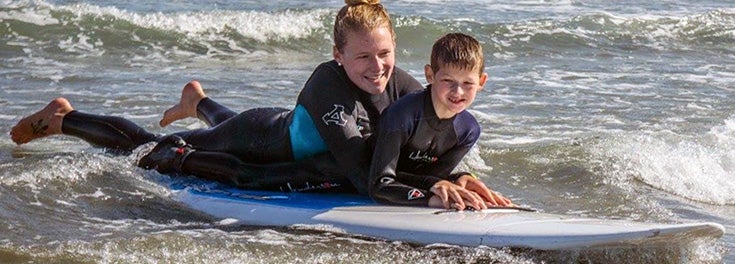
Surf’s up, mate. These days, graduate student Kelli Hingerton is on the western coast of Australia—launching a surf therapy program for children with disabilities.
“This is my dream,’’ says Hingerton. “Surfing has always been a part of my life. To be able to share that passion with children across the world is exciting.’’
Emily Clapham, an associate professor of kinesiology in the College of Health Sciences, created the surf therapy program in 2010 at Narragansett Town Beach, but this is the first effort to bring it to an international group.
I’m hoping that more countries will view the sport of surfing as a therapeutic model for children with disabilities.
The program pairs URI students with children who have various disabilities, including Down syndrome, autism spectrum disorder, attention deficit hyperactivity disorder, cerebral palsy and developmental delays.
Clapham says the benefits of surfing therapy are tremendous. Her studies show that surfing improves core strength, balance, upper body strength and cardio-respiratory endurance. It also boosts self-esteem and confidence—maybe its greatest advantages.
“Many children, especially children with autism spectrum disorder, get into a routine that’s hard to break out of,’’ says Clapham. “It’s even difficult to get them engaged in physical activity. Our research on surf therapy demonstrates that surfing empowers with the willingness to try new things. It also allows them to interact with their peers and teachers and be physically active at the same time, improving psychomotor and social skills simultaneously.’’
Both avid surfers, Hingerton and Clapham believe in the calming and spiritual benefits of the activity. Clapham grew up surfing at the beaches in Westerly, South Kingstown and Narragansett. Hingerton began surfing as a child on Long Island. “It was my version of flying. Surfing is also a real community, a way of life.’’
As an undergraduate kinesiology major at URI, spent hours surfing in her free time. When she heard about Clapham’s program, she jumped at the opportunity. It’s enormously satisfying, she says, to see the transformation. At first, children are afraid to touch the water; after a few sessions, they run to it.
“It’s great to see them overcome all the odds stacked against them,’’ says Hingerton, “They can do everything we do. They just do it their own way.’’
http://www.uri.edu/who/emily-clapham-2
Hingerton graduated in May and is now pursuing a master’s in education with her experience in Australia as the basis for her thesis. Clapham is expected to join Hingerton in Australia for two weeks this fall to help her get started, but, for the most part, Hingerton is on her own until she returns in mid-November.
Clapham has no doubt Hingerton will thrive. “She’s been a great student, and this is a wonderful opportunity,’’ says Clapham. “She’s going to do a terrific job in Australia. I’m excited to see our program grow at the international level, and I’m hoping that more countries will view the sport of surfing as a therapeutic model for children with disabilities.”
“We want this to go global,’’ says Hingerton. “We want it to go to every continent. That would be awesome.’’
Photo by Corey Favino, a photography student at URI.
